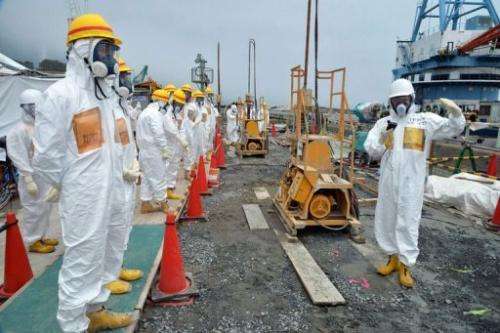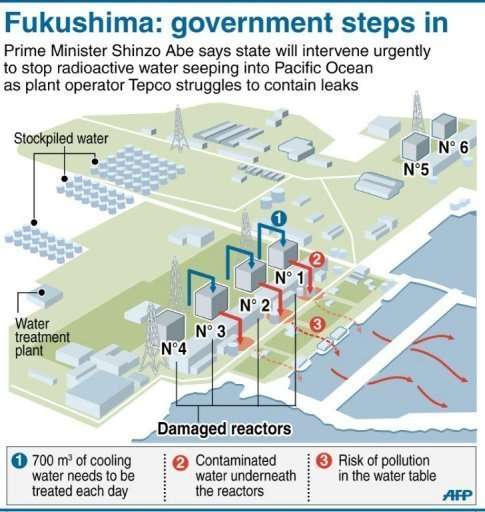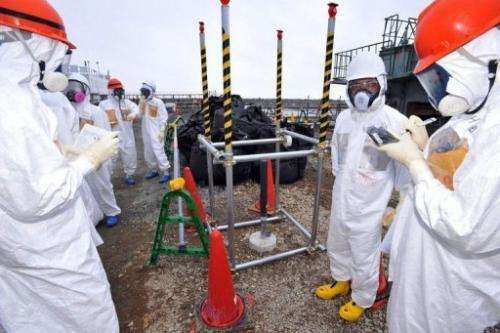Japanese nuclear experts inspect the Fukushima Dai-ichi plant in Okuma, on August 6, 2013. The operator of the crippled nuclear plant has started pumping out radioactive groundwater to reduce leakage into the Pacific ocean.
The operator of the crippled Japanese Fukushima Daiichi nuclear plant has started pumping out radioactive groundwater to reduce leakage into the Pacific ocean.
Tokyo Electric Power (TEPCO) began the work after it admitted last month that radioactive groundwater had been seeping out of the plant, confirming long-held suspicions that the sea was being contaminated.
The company said it pumped out 13 tonnes of groundwater from a well between 2:00 pm (0500 GMT) and 8:00 pm on Friday.
By mid-August, TEPCO plans to complete a new system enabling it to pump out 100 tonnes of groundwater a day. The water will be filtered and recycled to cool the reactors.
But there are growing fears that existing facilities will soon be overwhelmed, as TEPCO scrambles to find ways to process and store waste water.
"It has been an urgent issue for us to suck out groundwater from this area as soon as possible," a TEPCO spokesman said on Friday. TEPCO officials could not be reached on Saturday.
The embattled utility—kept afloat by a government bailout—last month admitted for the first time that radioactive groundwater had been leaking outside the plant.
It has since said tainted water has been escaping into the Pacific for more than two years since the atomic crisis triggered by a huge quake and tsunami in March 2011.
Danger of contaminated water leaking into the ocean at stricken Fukushima nuclear plant. The operator of the crippled nuclear plant has started pumping out radioactive groundwater to reduce leakage into the Pacific ocean.
An official at Japan's industry ministry said this week that Tokyo estimates 300 tonnes of contaminated groundwater may be seeping into the ocean every day.
"But we're not certain if the water is highly contaminated," he added.
The International Atomic Energy Agency said it stood ready to help, if asked.
"The IAEA has been informed by Japanese authorities about the leakage of radioactive water into the sea...and agency experts are following the issue closely," IAEA spokesman Serge Gas said.
"The agency has provided some recommendations to the Japanese authorities on the long-term management of liquid waste. The IAEA continues to be ready to provide assistance on request," he said.
Japanese officials inspect a monitoring well where high levels of radioactive materials were detected at the Fukushima Dai-ichi nuclear plant in Okuma, on August 6, 2013. The operator of the crippled nuclear plant has started pumping out radioactive groundwater to reduce leakage into the Pacific ocean.
Jerome Joly, deputy director general of the French Institute for Radiological Protection and Nuclear Safety which has closely monitored the disaster, said the environmental risk posed by the leaks was small compared to the overall radioactive contamination from the disaster.
"We are not seeing anything new in our measurements of the ocean water, sediment or fish. I think it is negligible."
Prime Minister Shinzo Abe has recently pledged deeper public involvement into the clean-up of the Fukushima plant.
While no one is officially recorded as having died as a direct result of the meltdowns at Fukushima, large areas around the plant had to be evacuated with tens of thousands of people still unable to return to their homes.
© 2013 AFP


























